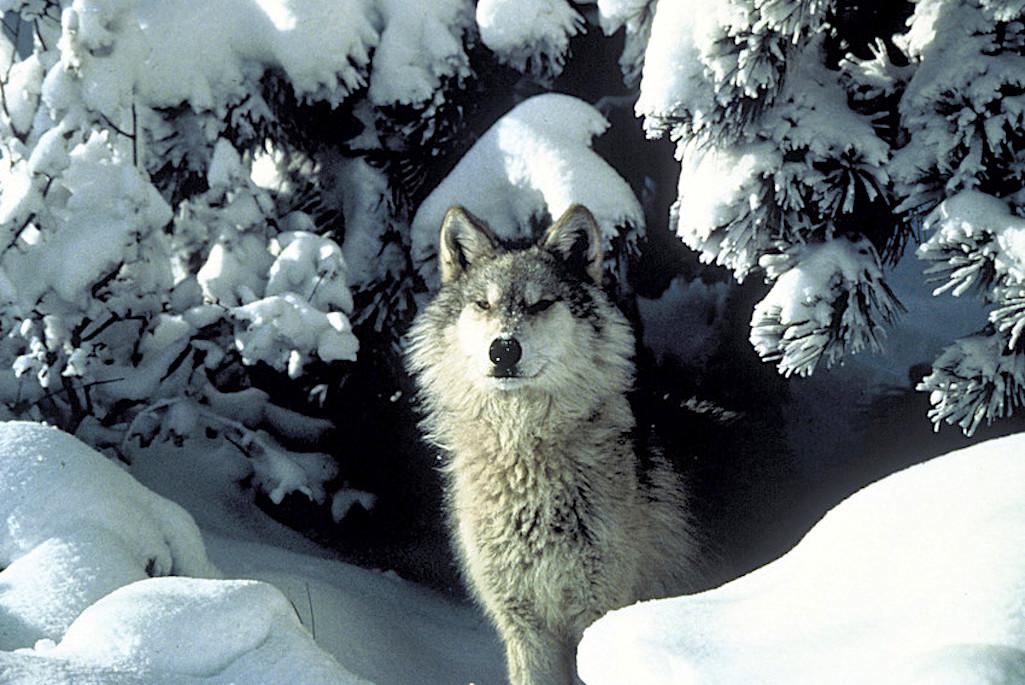
Legislation in the U.S. House of Representatives seeks to remove Endangered Species Act protections from wolves and grizzly bears in the Continental United States/UWFWS file
An effort to remove Endangered Species Act protections for wolves and grizzly bears has been launched in the U.S. House of Representatives, a move opponents say aims to jettison "the best tool for tackling the worsening extinction crisis."
It also comes during the 50th anniversary of the ESA, which has been credited with saving hundreds species, including the bald eagle, Kirtland's warbler, peregrine falcon, the gray wolf and the grizzly bear in the Lower 48 coterminus states.
The "Trust the Science Act" introduced by Rep. Lauren Boebert and cosponsored by 24 of her colleagues would remove ESA protections from the gray wolf within 60 days of the bill's enactment. Boebert's effort comes as a voter-approved wolf-recovery effort is underway in Colorado.
“People in the Denver suburbs don’t understand wolf attacks. They see filtered images through the media of cute little wolf pups," she said last week as the House Committee on Natural Resources Subcommittee on Water, Wildlife, and Fisheries held a hearing on her bill. "But in reality, wolf attacks are gruesome. I have received many letters from families, farmers, and ranchers across Colorado who have reached out to my office since they have nowhere else to turn. I am committed to being rural Colorado’s voice in Congress and finding appropriate management solutions. Gray wolves are fully recovered, should be delisted in the lower 48, and should be managed by states.”
Roger Dobson, a Cowlitz Tribal member and director of Tribal Cultural Resources for Protect the Wolves, called it "deeply offensive that Congress is even considering this attack on wolves, when tiny wolf populations from Maine to California are still struggling to become established. Wolves are sacred to Indigenous peoples, yet this proposed legislation is a bald attempt to clear the way for a return to the eradication policies of the past, which targeted not just wolves, but Indigenous peoples as well.”
Other legislation that aims to weaken environmental protections for wildlife include a measure sponsored by Rep. Harriet Hageman (R-Wyo.) and Rep. Matt Rosendale (R-Mont.) to delist Yellowstone and Northern Continental Divide grizzly bears and another, also sponsored by Rosendale, that would override a court decision on the management of threatened and endangered species on public lands.
Rosendale's Forest Information Reform Act seeks to overturn a 2015 court ruling that directed the U.S. Forest Service and Bureau of Land Management to involve consultations with the U.S. Fish and Wildlife Service over management plans that could impact species.
"The Cottonwood decision has been weaponized by radical environmental groups to use the Endangered Species Act to prevent proper forest management,” Rosendale said last week as the same House committee considered his legislation. “The FIR Act is a common-sense solution that would prevent the Forest Service from facing a perpetual cycle of litigation and allow them to chart a new era of efficiency, which will benefit Montanans and those across the nation.”
Jonathan Wood, who oversees law and policy for the Property and Environment Research Center based in Bozeman, Montana, said the "Cottonwood case, brought by self-described ‘radical environmentalists,’ contributed substantially to a 15-year-delay in the project and kept Bozeman exposed to the risk that a catastrophic wildfire would mar our viewshed, scorch wildlife habitat and cherished recreation areas, and leave the city with a mere three days of drinking water.”
Among those pushing back against the Republican measures was Jamie Rappaport Clark, president and CEO of Defenders of Wildlife.
"Iconic species like the gray wolf and grizzly bear continue to face cruel and unprecedented attacks at the state level, and their chances of recovery will be severely jeopardized if anti-wildlife extremists in Congress strip them of federal protections under the Endangered Species Act," she said.
“These bills represent a disgusting, short-sighted attack from pro-extinction members of Congress eager to see our strongest law for preventing extinction weakened, even if they have to do it one species at a time,” added Mary Beth Beetham, legislative director for Defenders of Wildlife. “Congress attacking the Endangered Species Act is also a direct attack on our biodiversity and life as we know it. At this rate, bills damaging the Endangered Species Act are being introduced at a rate of more than one per week.”
William Walksalong, tribal administrator for the Northern Cheyenne Tribe in Montana, wrote Rep. Cliff Bentz, a Republican from Oregon who chairs the Natural Resources Subcommittee on Water, Wildlife, and Fisheries, to voice his opposition to the measures aimed at grizzly bears.
"The Northern Cheyenne people once shared our traditional homelands in the Tongue River and Powder River basins with grizzly bears. Grizzly bears once ranged through the traditional territory of the Northern Cheyenne people, including lands within the boundaries of the Northern Cheyenne Reservation in southeast Montana," wrote Walksalong. "However, like the territory of the Northern Cheyenne people, the range of the grizzly bear was vastly diminished as the result of encroachment by settlers and prospectors beginning in the 19th century. Since that time, grizzly bears in the region have been limited to Yellowstone National Park and surrounding areas and are no longer present on the Northern Cheyenne Reservation.
"The Northern Cheyenne people view the grizzly bears as a spiritual relative and have great respect for the bear's strength and power, as well as its right to live free from harm," he continued. "We believe that the Creator gave the grizzly bear a spirit in the same way that the Creator gave us a spirit, and that the grizzly bear has a right to exist and to be left alone. ... The tribe opposes any effort by Congress to reduce legal protections for grizzly bears in Montana and Wyoming. Such legislative delisting would almost certainly result in Wyoming, Montana, and Idaho opening up hunting seasons for grizzlies."


